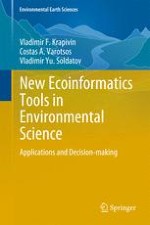This book provides new insights on the study of global environmental changes using the ecoinformatics tools and the adaptive-evolutionary technology of geoinformation monitoring. The main advantage of this book is that it gathers and presents extensive interdisciplinary expertise in the parameterization of global biogeochemical cycles and other environmental processes in the context of globalization and sustainable development. In this regard, the crucial global problems concerning the dynamics of the nature-society system are considered and the key problems of ensuring the system’s sustainable development are studied. A new approach to the numerical modeling of the nature-society system is proposed and results are provided on modeling the dynamics of the system’s characteristics with regard to scenarios of anthropogenic impacts on biogeochemical cycles, land ecosystems and oceans. The main purpose of this book is to develop a universal guide to information-modeling technologies for assessing the function of environmental subsystems under various climatic and anthropogenic conditions.
